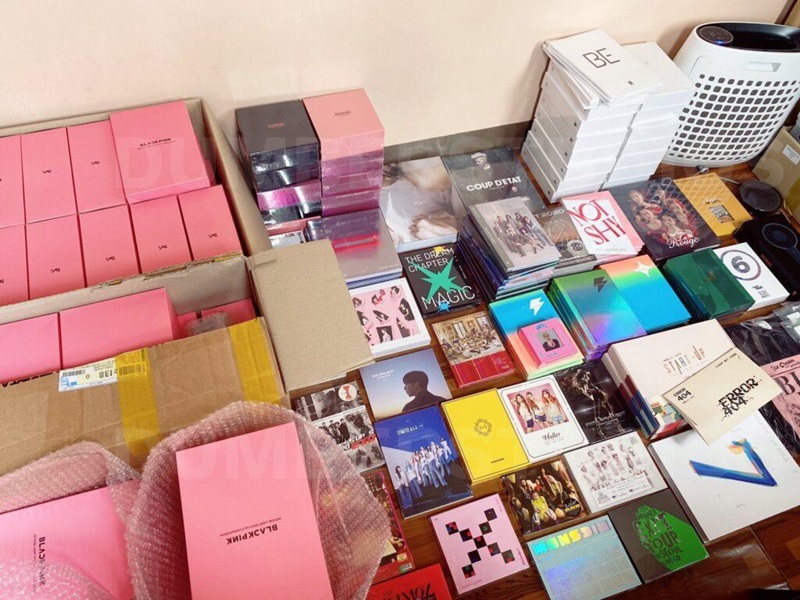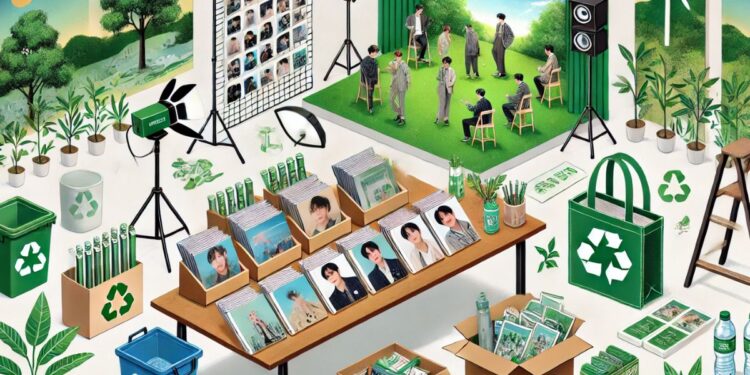The Korean content industry—covering K-pop, K-dramas, and K-movies—has captivated audiences worldwide. However, alongside this global success of Korean content, there is an urgent call to prioritize eco-friendly practices. This article will explore the eco-friendly practices emerging in K-content production and the steps industry leaders take to reduce environmental impact.
Sustainability in the Korean Content Industry
With increasing content production and consumption, concerns about the industry’s environmental impact are growing. From the reliance on single-use plastics in K-pop albums and merchandise to the carbon emissions generated by large-scale productions, adopting sustainable solutions has become essential for the Korean entertainment sector.
The Alarming Plastic Footprint of K-Pop Albums

According to a recent report by The Straits Times, plastic usage in K-pop albums has skyrocketed 14 times over the past six years. This surge in plastic consumption is attributed to the rise in physical album sales, driven by exclusive photobooks, collectibles, and fan events that come with these albums.
To give some perspective, in 2017, approximately 2,620 tons of plastic were used for K-pop albums. By 2023, this number soared to 37,360 tons, raising significant concerns about environmental sustainability in the K-pop industry. In 2024, the waste reduction reflects growing eco-awareness.
Eco-Friendly Initiatives in K-Pop
Despite the alarming statistics, several agencies and artists are promoting sustainability. Here are some notable eco-friendly practices being adopted:
Sustainable Packaging
Entertainment companies like HYBE, SM Entertainment, YG Entertainment, and JYP Entertainment have started experimenting with recyclable and biodegradable materials for album packaging. Some artists have released special editions with minimal plastic and eco-conscious designs.
Digital Albums & NFTs
With the rise of digital platforms, many companies promote digital albums and collectible NFTs as an alternative to physical albums. This shift could significantly reduce plastic waste while providing fans with innovative digital content.
Merchandising with a Green Twist
Beyond albums, K-pop merchandise is also undergoing a green transformation. Companies are launching eco-friendly merchandise, such as reusable water bottles, tote bags, and apparel made from recycled materials. They also tried to release water-soluble photocards.
Limiting the Versions
According to surveys conducted by Kpop4Planet, some K-pop fans support the idea of Korean entertainment companies limiting the number of album versions released by their artists. They find it excessive and wasteful when an artist drops seven different versions of an album in a single comeback.
Sustainability in K-Dramas & K-Movies
While the K-pop industry faces plastic-related challenges, K-dramas and K-movies address sustainability through eco-friendly production practices. Here’s how:
Green Filming Practices
Major studios are adopting green filming guidelines. It includes reducing energy consumption on set, limiting single-use plastics, and ensuring proper waste disposal.
Virtual Production Techniques
Korean studios invest in virtual production technologies like LED stages and computer-generated environments. These techniques minimize the need for on-location shooting, reducing travel emissions and lowering the overall carbon footprint.
Storylines Promoting Sustainability
Several recent K-dramas and films have incorporated eco-conscious storylines, raising awareness about environmental issues. K-drama series like “Move to Heaven” (2021) and “Forest” (2020) subtly weave themes of sustainability and conservation.
The Role of Fans in Promoting Sustainability
K-content fans, or Hallyu enthusiasts, are critical in encouraging sustainable practices. Fan clubs are increasingly organizing eco-friendly fan projects, such as planting trees in the name of their favorite idols or running plastic recycling drives during concerts. These initiatives show that sustainability is not just the responsibility of the industry but also a movement driven by its global audience.
Moreover, K-pop fans are increasingly aware that they shouldn’t contribute to more waste by purchasing excessive albums just to secure a chance for a fansign event or get a specific photocard.
Challenges and Opportunities Ahead
While progress is being made, the Korean content industry faces several challenges in fully adopting eco-friendly practices. The demand for collectible physical products, high energy consumption during global tours, and the sheer scale of content production make it difficult to go entirely green.
However, these challenges also present opportunities for innovation.
By adopting cutting-edge technologies, collaborating with eco-friendly partners, and engaging in industry-wide efforts, the Korean content industry can set a global benchmark for sustainable entertainment.
A Green Future for K-Content?
Sustainability in the Korean content industry is no longer a buzzword—it’s a necessity. As K-pop, K-dramas, and K-movies continue to dominate the global stage, the industry’s leaders are responsible for prioritizing eco-friendly practices. Significant strides are being made, from reducing plastic waste to adopting green filming techniques.
For fans and producers alike, it’s about creating a future where we can enjoy K-content guilt-free—knowing that behind the glamour, there’s a genuine effort to protect our planet.
Join us on Kpoppost’s Instagram, Threads, Facebook, X, Telegram channel, WhatsApp Channel and Discord server for discussions. And follow Kpoppost’s Google News for more Korean entertainment news and updates.
Related Posts
Source: The Strait Times, Kpop4Planet















